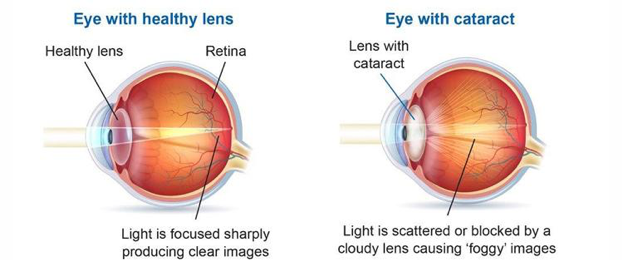A cataract is a clouding of the naturally clear lens inside the eye. The development of cataracts is a normal part of the aging process and usually takes place over the course of several years.

As cataracts develop and the lens clouds, you may experience a reduction in vision. This includes blurred vision, difficulty driving at night, glare, halos, needing more light to read, poor color vision, and reduced contrast sensitivity. Adjustments in glasses and contact lens prescriptions can be made to improve vision in early stages. Eventually, as the cataract progresses, changes in prescription will not help to improve vision. Surgical removal of the cataracts is indicated when the reduction in vision is impacting quality of life.
At The Koetting Associates Eye Center, we have co-managed thousands of cataract surgeries. We work only with the most experienced surgeons offering the latest in laser assisted cataract surgery. The introduction of the Femtosecond laser has made cataract surgery more accurate, more repeatable, and safer than ever before.
Cataracts are treated by removal of the cloudy lens and replacement with an artificial lens, called an intraocular lens implant. With today’s technology, there are several intraocular lens implants offered to fit you best. Implant options include standard lenses, multi-focal lenses, accommodating lenses, and toric lenses (astigmatism correcting). After extensive testing, the doctor will recommend a lens that best fits your needs.
Patient’s often ask if it they can continue to wear their glasses or contact lenses after the procedure. The short answer is, absolutely. While the surgeon’s goal is to implant a replacement lens to match your prescription, many patients still benefit from using glasses or contact lenses to sharpen their vision. It is often encouraged for patients to resume glasses or contact lens wear after surgery to maximize their vision potential following the cataract surgery.
A new protocol in cataract surgery becoming more popular is dropless cataract surgery. Until recently, post-operative care involved a month-long eye drop regimen. These drops help to ensure a smooth, safe recovery from the surgery. For some patients, drops may be time consuming, difficult to instill, and expensive. Dropless cataract surgery is achieved by injecting a compound medication into the eye directly following cataract surgery while the patient is still under anesthesia. This compound medication will contain most or all of the medications typically prescribed in drop form after surgery. Talk to one of our doctors at The Koetting Associates Eye Center today about how you could benefit from this new approach to cataract surgery.





